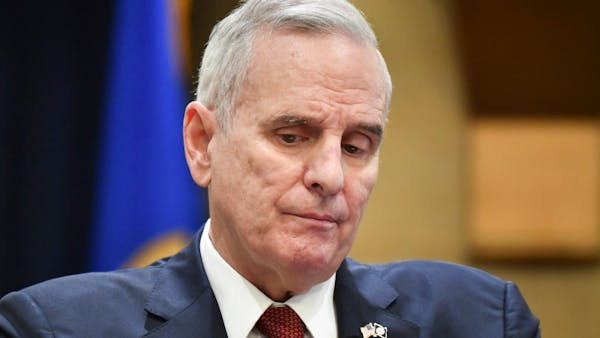Better schools, repaired roadways and more affordable health insurance are among the top priorities on Gov. Mark Dayton's final two-year spending plan for the state.
At $45.8 billion, Dayton's proposed 2018-19 budget amounts to a 10 percent increase from the current budget of $41.8 billion. Dayton and his budget chief said that's necessary to keep up with inflation and Minnesota's growing population.
A number of Dayton's recent, unfulfilled priorities resurfaced in the new proposal. Those include a gas tax to pay for work on roads and bridges, and money to help more students attend prekindergarten programs. It adds a new strategy for stabilizing health care costs: expanding the state's MinnesotaCare health insurance program to provide a public option for more people.
"My budget would continue making the investments our state needs to create opportunity for every Minnesotan," Dayton said Tuesday in presenting his proposal. "It would deliver excellent educations for all our students, support job creation across our state, and create cleaner, healthier futures for all Minnesotans."
The DFL governor acknowledged his spending blueprint faces an uphill battle with a GOP-controlled Legislature. Later in the day, Republican lawmakers confirmed that hunch, saying they agreed with many of the governor's priorities but not with how much he wants to spend.
Dayton said he's ready to negotiate and consider Republican suggestions. But he urged lawmakers to set aside differences and work quickly on what he called urgent issues facing the state.
"This is a year it really is imperative that the Legislature act," Dayton said of his transportation plan. "If they don't want to adopt my proposal, then they need to come up with one of their own and it has to be real funding," he said.
Much of the spending in the governor's plan draws from the $1.4 billion surplus expected to be left over at the end of the state's current fiscal year. Minnesota Management and Budget Commissioner Myron Frans said that showed how Dayton's previous budget priorities drove the state's fiscal health, touting a long run of positive budget balances, and rising bond ratings.
Frans and Dayton said they aim to continue that streak while also targeting more needs. Among them: $75 million to expand prekindergarten programs in more school districts and an additional $371 million to public schools, amounting to about 2 percent more spending per student in each of the next two years.
Public colleges and universities would get an additional $318 million, with some of the money designated for student financial aid, to help homeless students and to fund a new position aimed at combating sexual assault on college campuses.
Republican leaders were somewhat muted in criticism of Dayton's plan, likely because it came less than 24 hours after he collapsed while delivering his State of the State speech, followed Tuesday morning by his disclosure of a prostate cancer diagnosis.
House Speaker Kurt Daudt, R-Crown, and Senate Majority Leader Paul Gazelka, R-Nisswa, pledged to cooperate with Dayton on shared goals. They welcomed his focus on young students, and noted that Dayton had softened his long-standing universal pre-K push into a voluntary program.
Daudt said he'd prefer to see the state offer scholarships to families for prekindergarten programs at either public or private schools.
"We really want to offer the families that choice," he said, "but I think we need to focus on [helping] those early learners, and that's key to closing our achievement gap."
GOP leaders offered a stronger critique of Dayton's plan to spend $12 million to expand the MinnesotaCare public health program to more lower-income people. Gazelka said the strategy would likely end up mired in the same logistical problems that have plagued the state's MNsure program and wouldn't expand options for people in rural communities.
The governor's plan also sets aside $312 million in state reserves to fund a premium rebate program for many people who buy insurance on the individual market but don't receive subsidies. That plan has been the subject of a monthslong debate with Republicans, who recently drew up their own proposal covering premium relief and other health care provisions.
Dayton and Republican leaders said Tuesday they're nearing an agreement on the issue. Daudt said Republicans are willing to compromise on Dayton's insistence that insurance companies issue premium discounts for the state, rather than the state itself sending out rebate checks.
Meanwhile, Dayton will again push for a gas tax increase he said would cost Minnesotans about $3.50 per week and help the state cover an $18 billion shortfall in its transportation budget. He also proposed tax cuts that would reach about 450,000 residents, including farmers, parents paying for child care, and charities, among other groups.
Erin Golden • 612-673-4790
